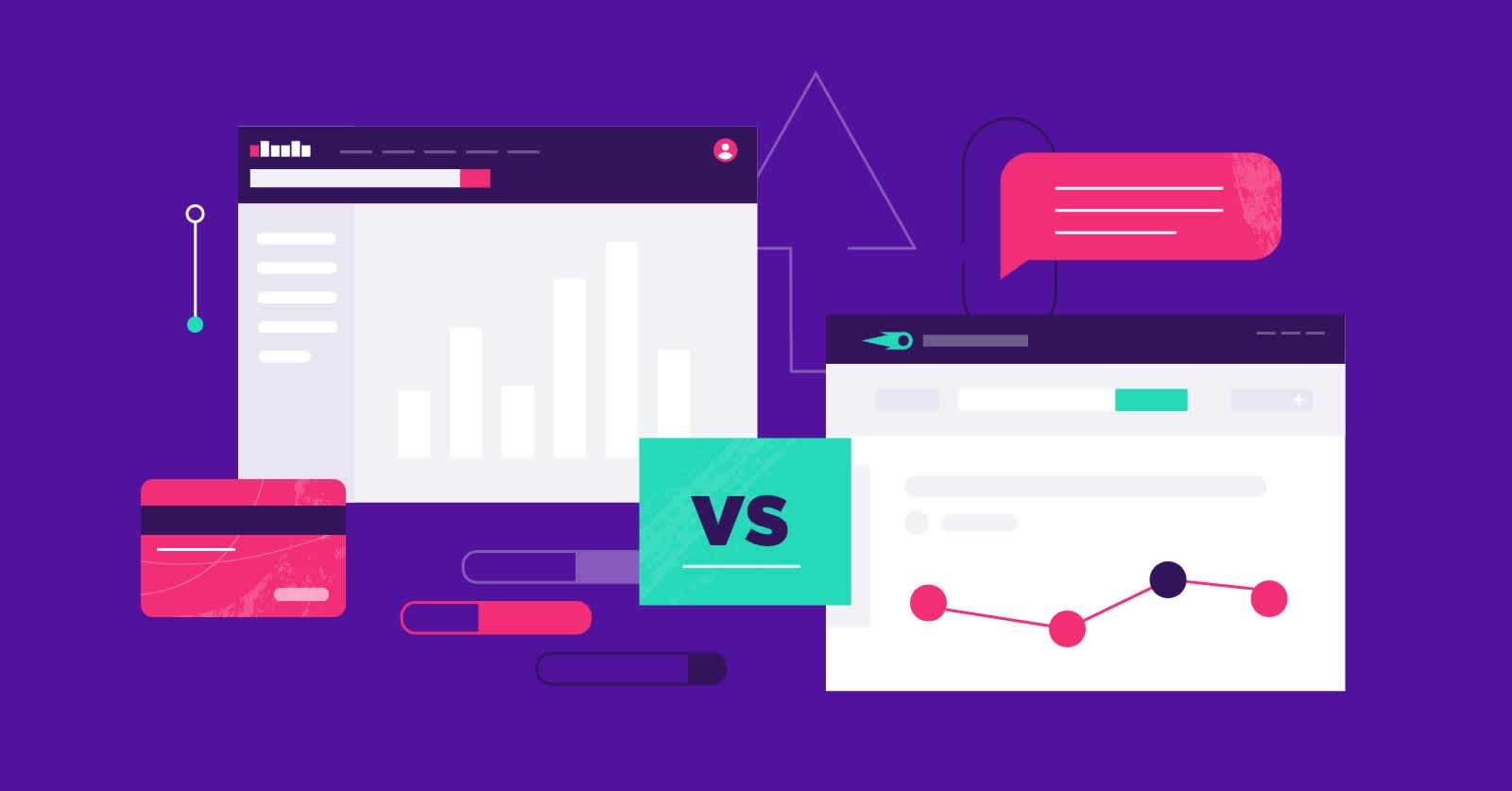In the world of eCommerce and digital marketing, Search Engine Optimization (SEO) plays an integral role in ensuring your website gets noticed. SEO helps improve a website’s visibility for relevant searches, affecting the website's organic or non-paid search engine results.
The choice of your website’s platform is one of the crucial factors affecting your SEO strategy. Two of the contenders are Shopify and WordPress. They are both outstanding platforms, but they differ in several ways regarding SEO capabilities. In this comprehensive guide, we'll delve into comparing the SEO features of Shopify and WordPress.
Why the comparison? When it comes to building an eCommerce website, Shopify and WordPress are the go-to platforms for most businesses. Determining how Shopify and WordPress handle SEO will help you decide which platform suits your needs.
Understanding Shopify
Shopify is a comprehensive eCommerce platform that allows businesses to launch and manage an online store without a high level of technical know-how. It’s a popular choice for businesses who want a complete package — website design, shopping carts, and hosting all included.
Shopify SEO Features
Shopify has in-built SEO features to help you optimize your site.
Automatic sitemap.xml: Shopify creates and automatically updates your website's sitemap.xml file, a crucial tool for SEO. This file enables search engines to crawl the site more intelligently, finding new pages for indexing.
Search engine listing preview: Shopify provides a simple feature to control how your website looks when shared on social media platforms.
SEO-friendly site structure: Shopify's structure is easy for search engines to crawl. It's clean, simple, and automatically generates canonical URL tags to prevent duplicated content.
Understanding WordPress
In contrast, WordPress is a content management system (CMS) which is also capable of hosting an online store with plugins like WooCommerce. It offers more creative control and flexibility, but it requires technical expertise to manage - especially for SEO.
WordPress SEO Features
WordPress doesn’t provide basic SEO features out of the box - you must install plugins like Yoast SEO or All in One SEO. These plugins add features similar to what Shopify provides. Below are features you can find on WordPress when used with SEO plugins:
Metadata control: Yoast SEO plugin lets you control the metadata for posts, pages, and categories which search engines love.
Breadcrumbs control: Website users and search engines both reap the benefits from having a well-structured breadcrumb navigation.
Sitemap control: You can manage your website's sitemap.xml file, an essential tool in directing how search engines index your site.
SEO-friendly Permalinks: WordPress allows you to customize URL structures which can be a plus for SEO.
Detailed SEO Comparison: Shopify vs WordPress
When it comes to Shopify vs WordPress SEO, let’s start by saying that both platforms can deliver excellent SEO results if used correctly. But how do they stand against each other?
Ease of Use
Shopify handles the technical side of SEO well, easily explaining how to optimize site speed, site structure, and HTTPS. Whereas with WordPress, you're in full control, and you have to manage these aspects yourself.
URL Structure
Both Shopify and WordPress allow you to edit your website’s URLs. However, WordPress offers more flexibility as you can adjust the site’s permalink settings.
SEO Plugins and Tools
WordPress provides more advanced SEO features through plugins. You can add rich snippets, manage 301 redirects, optimize for local SEO, and more. Shopify offers these features too, but WordPress provides a wider range of SEO plugins to choose from.
Speed and Site Performance
A website’s speed significantly affects SEO; slow-loading sites may result in lower search engine rankings and reduced user experience. Shopify stores are hosted by Shopify itself and offer excellent site speeds. On the other hand, WordPress users might need to invest in high-quality hosting providers to ensure the site stays speedy and secure.
Frequently Asked Questions about Shopify Vs Wordpress Seo
Which platform is better for SEO, Shopify or WordPress?
The effectiveness of SEO on Shopify or WordPress largely depends on your skill and understanding of SEO techniques. If you're a beginner in terms of SEO, Shopify might be the better option as it provides a more straightforward and user-friendly platform. However, if you're an experienced SEO strategist, you might get more out of WordPress due to its impressive range of SEO plugins and advanced customization capabilities.
Does the use of Shopify or WordPress impact the visibility of my site on search engines?
The visibility of your site on search engines can be affected by both Shopify and WordPress, but it primarily depends on how well you utilize the SEO features each platform offers. Shopify has SEO features built into the platform, and although it lacks the advanced SEO options WordPress offers, with the correct usage and understanding, it can be just as effective. Although WordPress requires the use of plugins for optimal SEO performance, it offers extensive customization which can potentially enhance your site's visibility significantly.
Which platform offers more SEO-related features and tools, Shopify or WordPress?
WordPress has a wider spectrum of SEO-related features and tools compared to Shopify. Many of these are available through plugins such as Yoast SEO and All in One SEO Pack, which are designed to help improve your website’s visibility and ranking in search engines. Shopify does offer basic SEO tools, but they lack the sophistication and extent of those provided by WordPress.
How does mobile SEO differ on Shopify and WordPress?
Both Shopify and WordPress are mobile-responsive platforms that allow your site to reformat itself for devices of different screen sizes, which is crucial for mobile SEO. However, the degree of mobile optimization can depend on the specific theme you choose on either platform.
What SEO plugins are available on Shopify and WordPress?
WordPress offers a wide variety of SEO plugins such as Yoast SEO, All in One SEO Pack, and SEOPress, providing choices for users to optimize their sites. Conversely, while Shopify doesn’t support SEO plugins in the same way as WordPress, it does have various SEO-oriented apps like SEO Manager, Plug in SEO, and SEO Booster.
How do I manage SEO effectively using Shopify and WordPress?
In Shopify, you can manage SEO primarily through its built-in SEO features, which include customizable headlines, titles, Meta tags, and URLs. Shopify also automatically generates a sitemap for your website. In WordPress, you would manage SEO through the use of plugins and detailed control over every aspect of your site's SEO elements, from custom post types, categories, tags, and more.
How does the ease of use of Shopify and WordPress affect SEO?
For beginners, Shopify's easy-to-use interface may mean a more streamlined, less confusing SEO experience. Shopify's simplicity allows users to do the basic SEO actions. On the other hand, while WordPress offers much more when it comes to SEO, it also involves a steeper learning curve which could become a hindrance for non-tech-savvy users.
Is either Shopify or WordPress faster in terms of loading time, and how could this impact SEO?
Page loading speed is crucial for SEO. Both Shopify and WordPress can offer fast loading speeds, but many factors can affect this, including the quality of your web host, the size of your page, and the efficiency of your code. As for their platforms, Shopify hosts websites themselves and thus control the potential factors that can slow down the systems, aiming to offer optimal loading speeds. With WordPress, the speed depends more on your hosting choice and website setup.
How are site maps handled on Shopify and WordPress for SEO purposes?
Shopify automatically generates a sitemap for your website, making it simpler for search engines to crawl and index your site's content. WordPress requires the use of a plugin, such as Google XML Sitemaps or Yoast SEO, to generate and manage a sitemap. This gives you more control, but it also requires a bit more involvement.
Shopify SEO Pros
Easy for Beginners
Quick learning curve
Shopify's platform is designed for novice users, providing a user-friendly interface that allows you to quickly understand how to implement basic SEO elements. This makes it simple to implement SEO practices without needing a deep understanding of the subject.
SEO app integration
Shopify's app store includes a variety of SEO applications that can automate or simplify a number of SEO tasks. These include keyword suggestions, on-page optimization suggestions, and more.
Speed and Security
Fast loading speed
Shopify's platform is optimized for speed, which can help improve your site's SEO. Faster loading times can lead to better rankings, as search engines consider page load time as a ranking factor.
Enhanced Security
Shopify's platform is heavily geared towards ecommerce, which means all of it's sites are equipped with an SSL certificate. This enhances your site's security, which not only builds trust with your customers but also improves your site's search engine ranking.
Mobile Optimization
Shopify's templates are mobile responsive, which is vital for SEO in a world where mobile search dominates. This ensures that your site will look and perform well on any device, which can increase user engagement and in turn, improve SEO.
Shopify SEO Cons
Lack of SEO Customizability
Limited URL structuring
With Shopify, you don't have the flexibility to customize your URLs in a way that you think is best for SEO. Their URL structure is rigid and automatically includes certain elements that may be unnecessary.
Limited blog optimization
Shopify's blog functionality is quite basic compared to other platforms and lacks some SEO optimization features. While it does provide basic blogging tools, you may find this feature limiting if you're planning on creating a complex content strategy.
Cost
Monthly subscription fees
Shopify requires a monthly subscription, which might not be ideal for startups or small businesses. While Shopify provides a variety of tools for SEO, the expense might not justify the benefits depending on your budget.
WordPress SEO Pros
Customization Options
Flexibility in SEO control
WordPress is highly customizable, giving you plenty of flexibility with your site's SEO. This includes customizing your URLs, meta tags, and more.
Powerful SEO Plugins
WordPress offers several powerful SEO plugins such as Yoast SEO, All in One SEO Pack, and Rank Math. These plugins provide comprehensive SEO customization and optimization features.
Extensive Blogging Capabilities
Feature-rich blog functions
WordPress was originally a blogging platform and provides a robust suite of blogging tools. This includes SEO-friendly features such as categories, tags, and an easy to understand permalink structure.
WordPress SEO Cons
Complexity
Steep learning curve
Although WordPress offers extensive customization features, it does come with a steep learning curve. Unless you have solid technical skills or are willing to learn, optimizing your WordPress site for SEO can take time.
Security Concerns
Vulnerability to attacks
WordPress sites can be vulnerable to attacks if not managed properly. If your site gets compromised, this could hurt your SEO. Going with a managed WordPress hosting or investing in a security plugin can mitigate this risk to some degree.
Speed Optimization needed
Unless you optimize your WordPress site for speed, it tends to load slower than Shopify sites. Site speed can influence SEO, affecting user experience and ultimately, your search engine ranking. It may require additional plugins or services to improve WordPress site speed.
Summary
So, you've taken a closer look at Shopify vs WordPress SEO and we've seen a bit of light on each platform's capabilities. Yes, both platforms have their pros and cons. Shopify is a simple, all-in-one solution, designed specifically for e-commerce, making it an excellent choice for those who are new to SEO or don't want to deal with the complexities of managing it themselves. On the flip side, WordPress gives you more flexibility and control over your SEO strategies, but it can be a bit of a learning curve if you're not technically inclined.
When comparing Shopify vs WordPress SEO, it really boils down to your specific needs, skills, and preferences. If you're just starting out and need something that's easy to use, Shopify might be the way to go. But, if you're tech-savvy, and you’re looking for a platform that gives you full control and the ability to truly customise your SEO, then WordPress might be a better fit. Either way, both platforms have the potential to boost your business and increase your visibility online, and that's really what SEO is all about.
As we wrap up our comparison of Shopify vs WordPress SEO, it's important to note that successful SEO, regardless of the platform, requires consistent effort, time and patience. It's about more than just picking the right platform; it's about understanding your audience, creating high-quality content that they'll find valuable, and implementing effective SEO strategies to improve your ranking in search engine results. So, whether you choose Shopify or WordPress, remember, the key to SEO success is understanding your audience and delivering valuable content, and a platform that best aligns with your branding and business goals.
About WebPerfex
At WebPerfex, we're a dynamic team of digital wizards hailing from lovely Sacramento, CA. We wear many hats, but our specialties lie in website design and SEO services. We are fuelled by a passion to help businesses create an impressive online presence and make the complex digital world a whole lot simpler. Our team works tirelessly, combining creativity with technical expertise to bring your brand vision to life and improve your business's performance. Remember the name - WebPerfex - when it comes to transformative digital solutions in the heart of Sacramento!




